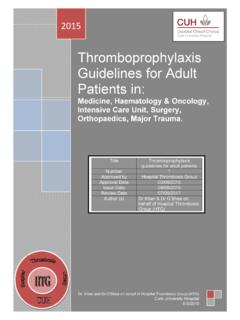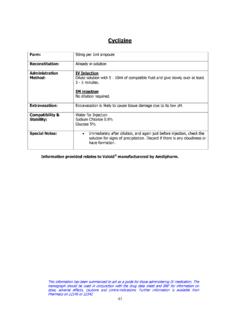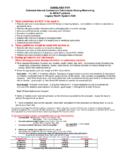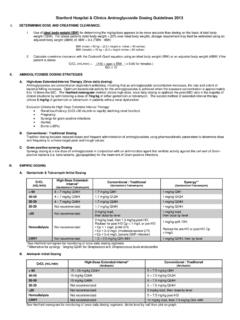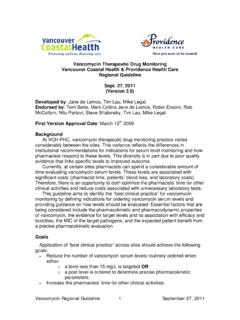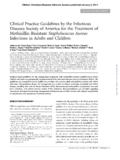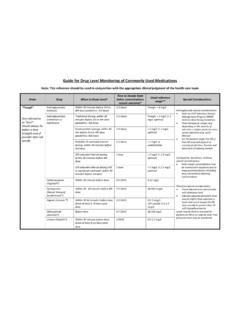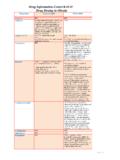Transcription of Adult Antimicrobial Guidelines 2011-2013 Cork …
1 CUH Adult Antimicrobial Guidelines 2011 - 2013 1 Adult Antimicrobial Guidelines2011- 2013 Cork University Hospital your hands wash your hands wash your hands wash your hands wash your hands wash your hands wash your hands wash your hands wash your hands wash your hands wash your hands wash your hands wash your hands wash your hands wash your hands wash your hands wash your hands wash your hands wash your CUH Adult Antimicrobial Guidelines 2011 - 2013 2 PPPRRREEEFFFAAACCCEEE The aim of this document is to provide guidance on the prudent use of antimicrobials at Cork University Hospital (CUH). These Guidelines have been produced by the Antimicrobial Stewardship Subcommittee of the Regional Infection Control Committee (RICC) HSE South. They have been adapted for CUH by Mala Shah ( Antimicrobial Pharmacist, CUH), Dr. Bartley Cryan and Dr.
2 Dan Corcoran (Consultant Microbiologists, CUH) and Paula Murphy (Senior Pharmacist, CUH). They have been approved by the Drugs and Therapeutics Committee, CUH. Disclaimer: While every attempt has been made to ensure the accuracy of the content, doctors should ensure that the correct drug and dose is prescribed, as is appropriate for each individual patient. The interpretation and application of the Guidelines remains the responsibility of the individual clinician. Please seek advice if in doubt. References that should be used in conjunction with these Guidelines include the British National Formulary (BNF) and the drug data sheets (available on ). It remains the responsibility of individuals to ensure they have the most up-to-date version of this guideline. This is available on the hospital intranet. We would like to thank our colleagues on the Antimicrobial Stewardship Subcommittee and doctors locally who have contributed to the Guidelines .
3 For any queries or comments, please contact Mala Shah, Antimicrobial Pharmacist, Cork University Hospital. Tel: 021 4922146 Email: CUH Adult Antimicrobial Guidelines 2011 - 2013 3 CCCOOONNNTTTEEENNNTTTSSS 1. Introduction p4 2. Restricted Antmicrobials p8 3. Meningitis p9 4. Ear, nose and throat infections p11 5.
4 Lower respiratory tract infections p13 6. Endocarditis p19 7. Septicaemia p22 8. Gastro-intestinal infections p25 9. Genito-urinary infections p27 10.
5 Skin, soft tissue, bone and joint infections p29 11. Viral infections p33 12. Fungal infections p34 13. Ophthalmic infections p35 14. Surgical prophylaxis p36 15.
6 Meningitis prophylaxis p41 16. Endocarditis prophylaxis p43 17. Management of patients post splenectomy and hyposplenic patients p45 18. Appendix 1: Switch of intravenous to oral antibiotic therapy p50 19. Appendix 2: Aminoglycoside monitoring Guidelines p52 20. Appendix 3: IV Vancomycin dosing and monitoring Guidelines p54 21.
7 Appendix 4: Management of Clostridium difficile associated diarrhoea p56 22. Appendix 5: Treatment and eradication of MRSA p60 23. Appendix 6: Renal impairment: Antimicrobial dosing for adults p62 24. Appendix 7: Administration of intravenous antimicrobials p70 25. Appendix 8: Antimicrobial prescribing tips p81 CUH Adult Antimicrobial Guidelines 2011 - 2013 4 IIINNNTTTRRROOODDDUUUCCCTTTIIIOOONNN This is a guide to empiric treatment of commonly seen infections in hospitals.
8 If in doubt, always seek advice. Useful numbers: Microbiology: extension 22504 / 22694 Infectious Diseases SpR: bleep 203 Antimicrobial Pharmacist: bleep 479 Pharmacy: extension 22146 / 22542 Before starting antibiotics The decision to prescribe an antibiotic must be based on clinical evidence of infection. Establish a provisional diagnosis. This will give an indication of the most likely causative organisms, and the most suitable empiric treatment. If possible, take samples (especially blood cultures) for culture and sensitivity testing before starting antibiotics. In certain circumstances, suspected bacterial meningitis, antibiotics should be given immediately. In patients with life threatening infections, do not delay empirical therapy whilst awaiting microbiology results. Consider the patient s medical history when deciding on treatment options: check allergy status, renal and hepatic function, pregnancy or breast feeding and concomitant medication.
9 Refer to the BNF for drug drug interactions. If there has been a history of anaphylaxis with penicillin avoid the following antibiotics: all beta lactam antibiotics ( penicillin, flucloxacillin, amoxicillin, ampicillin, co-amoxiclav, piperacillin-tazobactam, meropenem) and cephalosporins. There is a 10% cross- sensitivity with cephalosporins in penicillin allergy and they may be trialled in patients with a penicillin allergy that was not severe, mild rash only. Ensure allergy box is completed on the drug charts and cover of notes. See back page of Guidelines for more details on suitability of individual antibiotics in penicillin allergy. Take account of recent culture reports as empiric treatment may require modification as a result: recent MRSA culture. Recent antibiotic use - consider use of an antibiotic from a different class, if suitable.
10 Always document the reason why an antibiotic is commenced, and the proposed duration of treatment. Take appropriate samples. Refer to the Laboratory Users Manual. CUH Adult Antimicrobial Guidelines 2011 - 2013 5 A microbiology result should not be examined in isolation: treat the patient, not the result. The sensitivity profile on the report is not necessarily a recommendation to treat with antibiotics, as organisms of no clinical significance may grow from non-sterile sites (colonisation). Reviewing antibiotic treatment Review need and choice of antibiotic daily. When sensitivities are known, change to the narrowest spectrum agent to which the culture is sensitive. If in doubt, seek advice. Route of administration: although severe infections may require intravenous antibiotics, where possible use oral therapy. See Appendix 1, p50-51 for more information.
